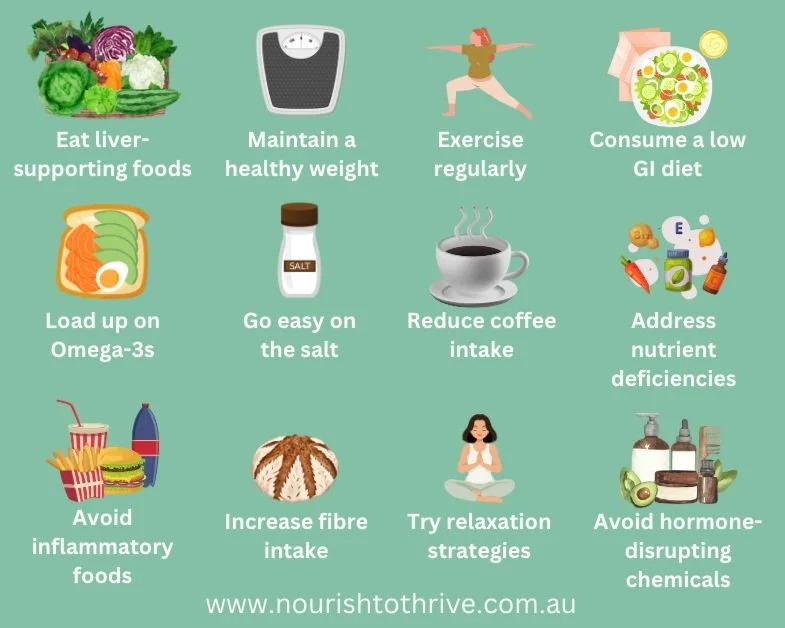Hormone-balancing tips
Hormone-balancing nutrition tips
Did you know that as many as 90% of women report having at least one premenstrual symptom each month, 50% have several symptoms and a further 3-8% experience symptoms that are so severe that they impair daily function?
PMS, or premenstrual syndrome, is predominantly caused by hormonal imbalance but other contributing factors include stress, nutritional deficiency (particularly magnesium and vitamin B6), alcohol consumption, poor gut health and diets high in sugar, salt and fat.
Many women in their 40s and 50s (and some adolescents too) feel that they are at the mercy of their fluctuating hormones but there are things we can do to restore balance and reduce (or eliminate) PMS symptoms:
Follow a low glycaemic index (GI) diet withegular small meals to stabilise blood sugar levels, reduce cravings and prevent weight gain.
Consume liver-supporting foods to promote detoxification of ‘old’ hormones and removal of excess oestrogen from the body, e.g. cruciferous vegetables (broccoli, cabbage, cauliflower, Brussels sprouts), raw carrot, dandelion tea, leafy greens, green tea, citrus fruits, berries, garlic, onions, turmeric and broccoli sprouts.
Include tryptophan-rich foods in the diet to naturally increase serotonin levels, e.g. turkey, bananas, cottage cheese, pumpkin seeds, sesame seeds, legumes and dairy products.
Eat a diet high in fibre to ensure regular bowel movements and assist with excretion of excess oestrogen.
Increase intake of omega-3 fatty acids, for example, oily fish, olive oil, avocado, nuts and seeds.
Reduce caffeine intake and eliminate inflammatory foods, e.g. saturated fats and sugar
Reduce salt intake to minimise fluid retention
Maintain a healthy weight - being overweight can make PMS symptoms worse
Engage in gentle to moderate physical activity at least three times a week to promote good mental health and reduce PMS symptoms.
Reduce stress by incorporating relaxation techniques into your daily routine and ensuring adequate quality sleep.
Consider nutritional supplementation (seek professional guidance first) - B vitamins, calcium, essential fatty acids, evening primrose oil, magnesium, tryptophan/5-HTP, vitamins D, E and zinc may be beneficial in balancing hormones, supporting detoxification of excess oestrogen and managing stress.
Reduce exposure to toxins, especially environmental oestrogens (xenoestrogens). Xenoestrogens are hormone-disrupting chemicals found in plastics and pesticides that mimic our natural hormones and bind to hormone receptors, allowing oestrogen to build up in the body and contributing to oestrogen dominance. Xenoestrogens are also associated with early onset puberty. Ways to reduce exposure to xenoestrogens include storing and heating food in glass or stainless steel, not plastic, avoiding plastic water bottles, eating pesticide-free fruit and vegetables, using natural cosmetics, skin care and cleaning products.
Book a consultation or free discovery call if you would like help to balance your hormones and reduce PMS symptoms.
Are you in your 40s or 50s and ready to take control of your hormones? My Perimenopause Nutrition Reset Mini-Course will help you balance your hormones, boost your energy, and ease perimenopausal symptoms—join today for just $39!

